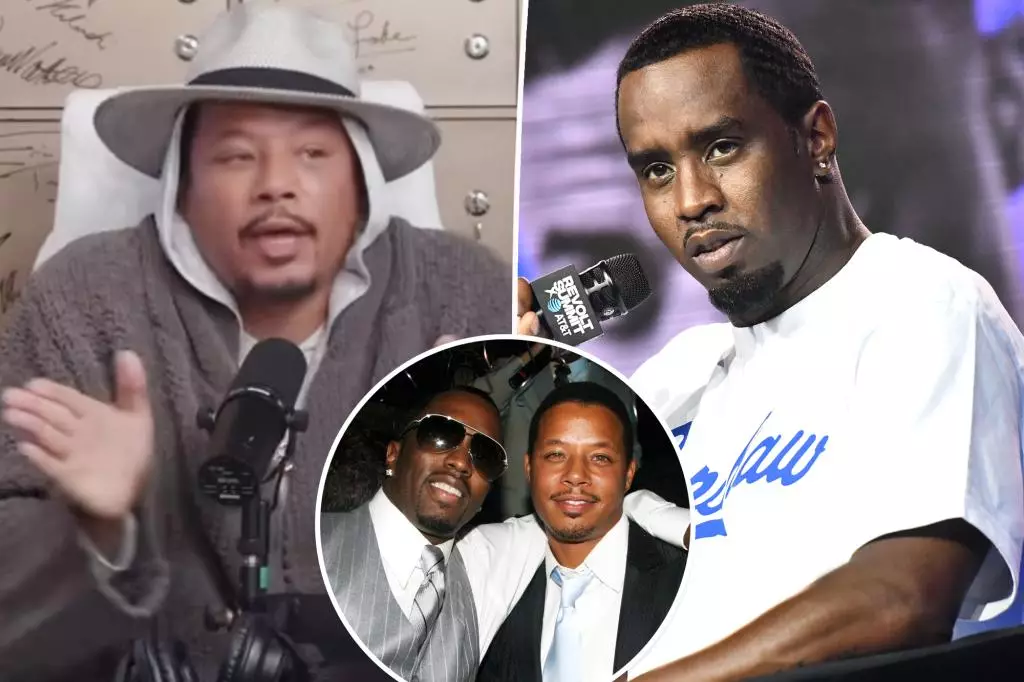In a recent interview that has stirred significant interest and controversy, Terrence Howard made wild allegations against Sean “Diddy” Combs, claiming that the music mogul made advances toward him. On the “PBD Podcast,” Howard recounted how Combs, who is currently entangled in serious legal issues involving federal sex trafficking charges and multiple sexual assault lawsuits, allegedly attempted to seduce him. This explosive claim adds another layer to a narrative that has already created waves in the entertainment world.
Howard described his initial collaboration with Combs as an invitation to serve as an acting coach, but what unfolded during their interactions raised his eyebrows. The atmosphere was unsettling; Combs, according to Howard, would merely sit and observe without engaging meaningfully. While Howard tried to share his musical talents with Combs, what initially seemed like an opportunity turned into a confusing encounter that led him to question Combs’ true intentions.
This kind of experience—where power dynamics in Hollywood can lead to unexpected and troubling encounters—reveals the darker underbelly of fame and the challenges faced by those in the industry. Howard’s revelation shines a light on an age-old issue in Hollywood: the misuse of power and the blurred lines between professional relationships and personal advances.
The Assistant’s Revelation
As the interactions continued, Howard sought clarity from his assistant, whose blunt remark—“I think he’s trying to f**k you”—prompted him to terminate all communications with Combs. This reaction underscores a fundamental concern in Hollywood: the harassment that can occur behind closed doors, often dismissed or overlooked until vocalized. Howard’s experiences resonate with many who have found themselves in vulnerable situations, caught between ambition and unwanted advances.
This incident raises questions about the environment within the entertainment industry, where the allure of fame often comes intertwined with potential exploitation. The mere act of having to scrutinize a colleague’s motives illustrates an unsettling reality for many artists and actors who navigate the industry. It begs the question: how many others have faced similar situations but felt pressured to stay silent out of fear of career repercussions?
Power Dynamics at Play
Howard did not shy away from illustrating the broader patterns he perceives within Hollywood, noting similar experiences with various producers. He highlighted a critical sentiment about masculinity and respect in his statements, indicating that he has had to defend himself both physically and emotionally against unwanted advances. “When you approach a real man about his masculinity, you’re going to get a real reaction back,” Howard stated, revealing the conflicts that can arise when personal boundaries clash with professional ambitions.
What’s striking is Howard’s refusal to compromise on his values regarding the roles he undertakes and how he presents himself professionally. He articulated his stance clearly: he does not engage in roles that involve compromising his integrity or his sense of self. This statement resonates as a rallying cry for those navigating similar challenges where the personal and professional collide. It is a stark reminder that many individuals in the film and music industries maintain a code of personal ethics that sometimes runs counter to the expectations set by those who wield power.
Broader Implications of the Allegations
As Howard’s allegations gain traction, they highlight a broader dialogue about the culture of silence surrounding such claims. High-profile personalities like Nick Cannon and Justin Bieber have distanced themselves from allegations of Combs’ so-called “Freak-Off” parties, raising further questions. The inconsistent narratives from various stars underscore a critical inconsistency within the entertainment community regarding accountability.
Howard’s claims come at a time when other individuals—less well-known but no less impactful—are also sharing their stories about experiences with the music mogul. The lawsuit brought forth by Joseph Manzaro, alleging that Combs engaged in trafficking and violence, adds weight to the discussions surrounding Combs’ reputation. Combs has adamantly denied these accusations, framing them as fabrications aimed at exploiting his status for personal gain.
This dialogue fosters a necessary reflection within the industry about the importance of survivor narratives and the essentiality of creating safe work environments. As allegations continue to emerge, evaluating the structures in place to support victims—and to deter potential predators—becomes imperative.
The Crossroads of Fame and Morality
As the entertainment world grapples with these serious allegations, the intersection of fame, power, and morality is rendered painfully apparent. Terrence Howard’s allegations against Diddy serve as a potent reminder that the façade of celebrity can sometimes mask disturbing truths. It underscores the necessity for industry-wide reforms and the importance of standing up against systemic issues that allow such behavior to continue unchecked. In an era where accountability begins to take precedence, the silence that once protected many may no longer be an option.

Leave a Reply